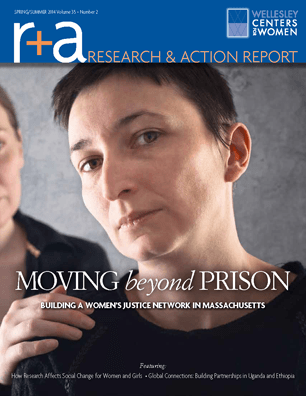Research & Action Report Spring/Summer 2014
The 58th United Nations Commission on the Status of Women (UN CSW) was held this past winter, but the work continues. After two weeks devoted to the assessment of whether the Millennium Development Goals (MDGs) are working for women and girls and trying to figure out what the post-2015 development agenda is going to look like, one thing is clear: We aren’t going to make real progress without good data.
At the UN and elsewhere, there is growing recognition that effective measurement and sophisticated statistics are essential to advancing women’s and girls’ equality and empowerment. Funders of all types are requiring hard evidence that the programs they fund are effective. Policymakers and development agencies demand data as evidence of impact. Media outlets—print, broadcast, and online—are similarly always in need of accessible, easy-to-understand, yet reliable data. And, perhaps most importantly, women’s social change organizations—from the largest to the smallest, from those that help through direct service to those that fight for justice at the societal level— need data to demonstrate that their programs effectively move the needle on social change.
There are a couple of key challenges, though.
We need to make research an integral part of social change work, not an afterthought. Without question, it is imperative that basic services for living are provided whenever we’re able to help. But often, we do have the opportunity to learn from others’ research and program evaluations so that we can understand what interventions and programs may work most effectively for particular populations. We should routinely incorporate research and evaluation into the launch of new initiatives to ensure that we’re tracking the efficacy and outcomes in order for us to determine if these are the most effective solutions for the social change we seek, and so that we can inform future strategies.
The in-house research capacity at many women- and girl-focused social change organizations is limited, however. After all, these organizations were formed to serve women and girls, not to research them.
But women-, girl-, and gender-focused research institutes have the expertise and focus to provide high-quality research in partnership with social change organizations and funders, while also providing data for policymakers, development organizations, advocates, and the media. In the U.S. and globally, there are numerous women-, girl-, and gender-focused research institutes—some affiliated with colleges and universities, others freestanding—that can fill the gap.
In addition to the Wellesley Centers for Women (WCW), for example, organizations such as the International Center for Research on Women (ICRW), the Institute for Women’s Policy Research (IWPR), the Girl Scouts Research Institute (GSRI), the Women’s Research and Resource Center (WRRC), the Women and Public Policy Program (WPPP), the Clayman Institute for Gender Research, and Catalyst all offer different angles on this kind of research. Re:Gender (formerly the National Council for Research on Women) maintains a list of these and many more such women-, girl-, and gender-focused institutes and centers. We can work
with organizations on the ground—as well as other research institutes that may not have gender expertise—to ensure that comprehensive data is collected and can be disaggregated. And we should all engage more effectively with the UN Global Gender Statistics Programme.
One of the most exciting parts of my job is representing the WCW at UN CSW meetings. As an official non-governmental organization (NGO) having Special Consultative Status with the Economic and Social Council (ECOSOC)
of the UN, WCW has both a right and a responsibility to weigh in on issues of importance that fall within the scope of our organizational mission. This year, we brought together a panel of researchers and activists during a parallel event to discuss how research can accelerate social change for women and girls.
The bottom line is that women-, girl-, and gender focused researchers and research centers and institutes are ready to partner, but they need to be recognized for their expertise and actively engaged in the social change process by other partners. As Melinda Gates so adroitly pointed out in an article last summer on ForeignPolicy.com, we are in the midst of a data revolution- but are we prepared to harness the power of this data revolution to advance the causes of women and girls?
Funders, policymakers, development organizations, and organizations on the ground all need research organizations. In fact, women-, girl-, and gender-focused research organizations are the missing link in the social change equation because they can effectively gather and analyze the data that lets us know when we are actually moving the needle on change. Plus, they can offer a socially conscious analysis based on their gender-informed perspectives.
Let’s admit it, no one thinks of research as the sexiest thing. But, in today’s world, research is necessary to get the greatest gains out of social change efforts. And do we want anything less for the world’s women and girls?


